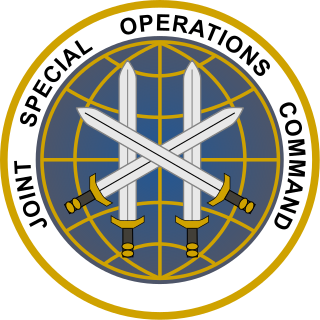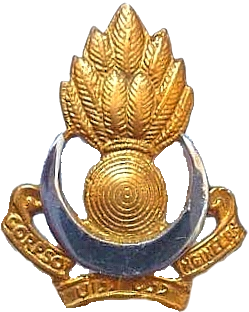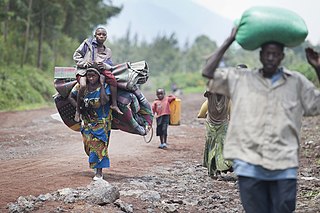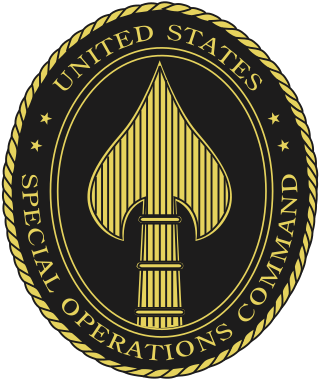
The Pakistan Armed Forces are the military forces of Pakistan. It is the world's sixth-largest military measured by active military personnel and consist of three formally uniformed services—the Army, Navy, and the Air Force, which are backed by several paramilitary forces such as the National Guard and the Civil Armed Forces. A critical component to the armed forces' structure is the Strategic Plans Division Force, which is responsible for the maintenance and safeguarding of Pakistan's tactical and strategic nuclear weapons stockpile and assets. The President of Pakistan is the Commander-in-Chief of the Pakistan Armed Forces and the chain of command is organized under the Chairman of the Joint Chiefs of Staff Committee (JCSC) alongside the respective Chiefs of staffs of the Army, Navy, and Air Force. All branches are systemically coordinated during joint operations and missions under the Joint Staff Headquarters (JSHQ).
The United Nations High Commissioner for Refugees (UNHCR) is a United Nations agency mandated to aid and protect refugees, forcibly displaced communities, and stateless people, and to assist in their voluntary repatriation, local integration or resettlement to a third country. It is headquartered in Geneva, Switzerland, with over 18,879 staff working in 138 countries as of 2020.
Spetsnaz, are special forces in many post-Soviet states. Historically, this term referred to the Soviet Union's Spetsnaz GRU, special operations units of the GRU, the main military intelligence service. Today it refers to special forces branches and task forces subordinate to ministries including defence, internal affairs, or emergency situations in countries that have inherited their special purpose units from the now-defunct Soviet security agencies.

Military police (MP) are law enforcement agencies connected with, or part of, the military of a state. In wartime operations, the military police may support the main fighting force with force protection, convoy security, screening, rear reconnaissance, logistic traffic management, counterinsurgency, and detainee handling.

An internally displaced person (IDP) is someone who is forced to leave their home but who remains within their country's borders. They are often referred to as refugees, although they do not fall within the legal definitions of a refugee.

The United Nations Organization Stabilization Mission in the Democratic Republic of the Congo or MONUSCO, an acronym based on its French name Mission de l'Organisation des Nations Unies pour la stabilisation en République démocratique du Congo, is a United Nations peacekeeping force in the Democratic Republic of the Congo (DRC) which was established by the United Nations Security Council in resolutions 1279 (1999) and 1291 (2000) to monitor the peace process of the Second Congo War, though much of its focus subsequently turned to the Ituri conflict, the Kivu conflict and the Dongo conflict. The mission was known as the United Nations Mission in the Democratic Republic of Congo or MONUC, an acronym of its French name Mission de l'Organisation des Nations Unies en République démocratique du Congo, until 2010.

The Jednostka Wojskowa Komandosów, commonly called JWK and formerly known as 1 Pułk Specjalny Komandosów, is one of six special forces units currently operating within Poland's Centrum Operacji Specjalnych - Dowództwo Komponentu Wojsk Specjalnych. JWK was formed in 1961 and is the oldest still active Polish special operations unit. The unit is located in Lubliniec, Poland. The regiment has carried out the majority of special operations that resulted in the gathering of the actual Polish Intelligence. In the early years of the global war on terrorism, The regiment carried out special operations alongside US Navy SEALs from the Naval Special Warfare Development Group also known as SEAL Team Six.

The Joint Special Operations Command (JSOC) is a joint component command of the United States Special Operations Command (USSOCOM) and is charged with studying special operations requirements and techniques to ensure interoperability and equipment standardization, to plan and conduct special operations exercises and training, to develop joint special operations tactics, and to execute special operations missions worldwide. It was established in 1980 on recommendation of Colonel Charlie Beckwith, in the aftermath of the failure of Operation Eagle Claw. It is headquartered at Pope Field.

The United Nations Mission in Liberia (UNMIL) was a United Nations peacekeeping operation established in September 2003 to monitor a ceasefire agreement in Liberia following the resignation of President Charles Taylor and the conclusion of the Second Liberian Civil War (1999–2003). At its peak it consisted of up to 15,000 UN military personnel and 1,115 police officers, along with civilian political advisors and aid workers.

The insurgency in Khyber Pakhtunkhwa, also known as the War in North-West Pakistan or Pakistan's war on terror, is an ongoing armed conflict involving Pakistan and Islamist militant groups such as the Tehrik-i-Taliban Pakistan (TTP), Jundallah, Lashkar-e-Islam (LeI), TNSM, al-Qaeda, and their Central Asian allies such as the ISIL–Khorasan (ISIL), Islamic Movement of Uzbekistan, East Turkistan Movement, Emirate of Caucasus, and elements of organized crime. Formerly a war, it is now a low-level insurgency as of 2017.
Insurgencies have been ongoing in Myanmar since 1948, the year the country, then known as Burma, gained independence from the United Kingdom. The conflict has largely been ethnic-based, with several ethnic armed groups fighting Myanmar's armed forces, the Tatmadaw, for self-determination. Despite numerous ceasefires and the creation of autonomous self-administered zones in 2008, many armed groups continue to call for independence, increased autonomy, or the federalisation of the country. The conflict is the world's longest ongoing civil war, having spanned more than seven decades.

The Pakistani intelligence community comprises the various intelligence agencies of Pakistan that work internally and externally to manage, research and collect intelligence necessary for national security. Consolidated intelligence organizations include the personnel and members of the intelligence agencies, military intelligence, and civilian intelligence and analysis directorates operationalized under the executive ministries of the government of Pakistan.

Lieutenant-General Nadeem Ahmad is a retired senior three-star ranking general officer who is famed and widely honored for planning and coordinating the relief and reconstruction non-combatant military operations after the devastating earthquake of October 2005. Securing the appointment as the director of Federal Relief Commission of Pakistan Army, his credentials secured him the directorship of the Earthquake Reconstruction and Rehabilitation Authority (ERRA). After serving in the military for nearly 40 years, he was duly appointed as the chairman of the National Disaster Management Authority (NDMA); his efforts included the successful disaster management and preparations to contain the nationwide 2010 floods and coordinate the rescue operations in the Hunza Valley, Attabad Lake, and the Airblue crash.
The 2009 refugee crisis in Pakistan was the massive displacement of civilians in the Khyber Pakhtunkhwa of Pakistan that was caused by Operation Black Thunderstorm.

The Pakistan Army Corps of Engineers,, is an administrative branch, and a major science and technology command of the Pakistan Army. Although the Corps is generally associated with dams, canals and flood protection, it performs variety of public works for the Government of Pakistan, only if it is ordered by the Prime Minister.

The Kampala Convention is a treaty of the African Union (AU) that addresses internal displacement caused by armed conflict, natural disasters and large-scale development projects in Africa.

Operation Zarb-e-Azb was a joint military offensive conducted by the Pakistan Armed Forces against various militant groups, including the Tehrik-i-Taliban Pakistan (TTP), the Islamic Movement of Uzbekistan, the East Turkestan Islamic Movement, Lashkar-e-Jhangvi, al-Qaeda, Jundallah and Lashkar-e-Islam. The operation was launched on 15 June 2014 in North Waziristan along the Pakistan-Afghanistan border as a renewed effort against militancy in the wake of the 8 June attack on Jinnah International Airport in Karachi, for which the TTP and the IMU claimed responsibility. As of 14 July 2014, the operation internally displaced about 929,859 people belonging to 80,302 families from North Waziristan.

The United States Special Operations Command is the unified combatant command charged with overseeing the various special operations component commands of the Army, Marine Corps, Navy, and Air Force of the United States Armed Forces. The command is part of the Department of Defense and is the only unified combatant command created by an Act of Congress. USSOCOM is headquartered at MacDill Air Force Base in Tampa, Florida.
Events in the year 2018 in Afghanistan.
Internally displaced persons in Syria are more than half the people fleeing the Syrian Civil War moved only within Syria itself. The United Nations High Commissioner for Refugees (UNHCR) estimates that 7 million persons in Syria are internally displaced or in need of humanitarian assistance, as of 2017. Most live in houses, often badly damaged by the war. Due to security concerns, poor access to areas of need and unpredictability, humanitarian efforts were directed at emergency aid. The complexity of administrative procedures and limited capacity of NGOs permitted to operate in Syria are also cited as challenges to assistance.












